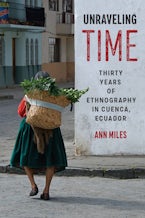Unraveling Time shows the anthropologist working on her craft. Through long-term, sensitive ethnography, Ann Miles captures the passing of time and the texture of change. She reveals her Cuencan partners as men and women grappling with economic shocks, a city transformed by migration, and the drama of sustaining transnational family ties. With her careful observations, Miles shows how they find meaning in all that has happened over the decades. It's a wonderful work of ethnographic reflection.
- Rudi Colloredo-Mansfeld, University of North Carolina, coauthor of Fast, Easy, and In Cash: Artisan Hardship and Hope in the Global Economy A thoroughly engrossing examination of gender, migration, and the evolving sociopolitical landscape of Cuenca, Ecuador, over the last three decades. With the attention, deep insight, and kinship with her interlocutors that can come only from long-term ethnographic engagement, Ann Miles introduces us to the complicated lives of the women and men she has followed for years. Through the sensitively told stories of these Cuencanos, we come to understand both the important (and conflicting) ways that transnationalism has shaped an entire country and the approaches through which one anthropologist has tried to make intellectual and emotional sense of a lifetime of ethnographic accruals. A superb book and must a read for scholars of transnationalism, Latin American migration, and gender in South America.
- Jason De León, UCLA, author of The Land of Open Graves: Living and Dying on the Migrant Trail This book joins a growing number of ethnographies by authors who reflect on their field work and research, grappling with the dynamic nature of temporal-spatial interactions that proceed apace as ethnographers and their interlocutors continue making their own histories and cultures far beyond the life of the anthropologist.
(Journal of Anthropological Research) Miles’s engaging prose makes the reading of this book not only informative but also highly enjoyable. . . . Reflecting on the arbitrariness of endings over time, Miles concludes an outstanding book whose ending, I hope, is just for the time being.
(Journal of the Royal Anthropological Institute) A rare intellectual gift...To learn with and about Miles’ ethnographic work in Cuenca, Ecuador, over the last three decades is a wonderous time travel experience.
(Anthropos) The essence of the story told in this book lies in its methodology-time itself. The book convincingly argues that this sustained engagement [over 30 years] brings us as close to people’s lived experiences as social science can get. Few other works highlight the existential turns of life as sharply as Unraveling Time: lights and shadows, remembering and forgetting debts paid and unpaid, origins and endings, tragedies and ironies. There’s a deep poignancy in the author’s commitment to bearing witness to the lives of Cuenca’s residents over so many years. After Miles’s initial journey to Ecuador in 1988, people wrote to her in Michigan and asked her not to forget them. She has remained true to her promise.
(Contemporary Sociology)

